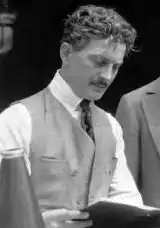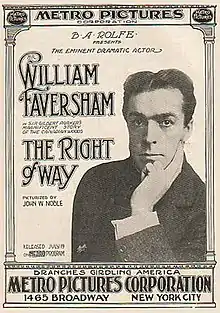John W. Noble
John Winthrop Noble (born Winfield Fernley Kutz; June 24, 1880 – September 10, 1946) was an American film director and screenwriter during the silent era.
John W. Noble | |
|---|---|
 Noble in 1917 | |
| Born | Winfield Fernley Kutz June 24, 1880 |
| Died | September 10, 1946 (aged 66) Pottstown, Pennsylvania, US |
| Occupation(s) | Film director, screenwriter |
| Years active | 1910–1927 |
| Spouse | Iva Barbour |
Career
John Winthrop Noble was the professional name of Winfield Fernley Kutz (sometimes given as Fernley Winfield Kutz), born June 24, 1880, in Pottsville, Pennsylvania.[1][lower-alpha 1][lower-alpha 2] He worked in various capacities with the Thanhouser Company from 1910 to 1912, assisting director Lucius J. Henderson and appearing in films including The Baseball Bug (1911) and The Poacher (1912). He worked briefly for Solax Studios, formed the short-lived Ryno Film Company with Clarkson Potter Ryttenberg in 1913, and directed films for the Ramo Company. In December 1913 he joined the staff of D. W. Griffith and became a director for the Mutual Film Corporation. Noble also worked for studios including the B. A. Rolfe Company (1914–16), Biograph Studios, Universal Pictures, Metro Pictures and Goldwyn Pictures.[2]
Called and later credited as Jack Noble,[3][4] he was known as Fernley Kutz at the time of his death September 10, 1946, at his home in Pottstown.[5]
Filmography

_-_4.jpg.webp)
_-_2.jpg.webp)
| Year | Title | Notes |
|---|---|---|
| 1911 | The Baseball Bug | |
| 1914 | The Three of Us | [6] |
| 1915 | Black Fear | Also screenwriter[6] |
| 1915 | The High Road | [6] |
| 1915 | Fighting Bob | [6] |
| 1915 | One Million Dollars | [6] |
| 1916 | The Bigger Man | [6] |
| 1916 | The Right of Way | [6] |
| 1916 | The Brand of Cowardice | [6] |
| 1916 | Man and His Soul | [6] |
| 1916 | The Red Mouse | [6] |
| 1916 | A Million a Minute | [6] |
| 1916 | Romeo and Juliet | Also screenwriter[6] |
| 1916 | The Awakening of Helena Richie | Also screenwriter[6] |
| 1916 | The Wall Between | [6] |
| 1917 | The Call of Her People | [6] |
| 1917 | Shame | Also screenwriter[6] |
| 1917 | The Power of Decision | [6] |
| 1917 | A Magdalene of the Hills | [6] |
| 1917 | Sunshine Alley | [6] |
| 1917 | The Beautiful Lie | [6] |
| 1918 | The Birth of a Race | Also producer, screenwriter[6] |
| 1918 | My Own United States | [6] |
| 1919 | The Gray Towers Mystery | Also screenwriter[6] |
| 1919 | The Golden Shower | [6] |
| 1920 | The Song of the Soul | Also screenwriter[6] |
| 1920 | Footlights and Shadows | [6] |
| 1922 | Cardigan | [6] |
| 1924 | His Darker Self | [6] |
| 1926 | Lightning Reporter | Also screenwriter[3] |
| 1927 | Burning Gold | [3] |
Notes
- Noble's December 1924 passport application states that "Fernley Winfield Kutz [is] professionally known as John Winthrop Noble". His birthplace is given as Pottstown, Pennsylvania.[1]
- Some sources state that John W. Noble was born in Albemarle County, Virginia, and omit his birth name—information derived from Noble's biography on page 194 of the 1919 Motion Picture Studio Directory.[2]
References
- National Archives and Records Administration (NARA); Washington D.C.; NARA Series; Passport Applications, January 2, 1906 – March 31, 1925; Roll # 2688; Volume #: Roll 2688 – Certificates: 501350–501899, 29 Dec 1924 – 31 Dec 1924. Ancestry.com. U.S. Passport Applications, 1795–1925 [database on-line]. Provo, UT, USA: Ancestry.com Operations, Inc., 2007. Retrieved 2016-12-24.
- Bowers, Q. David (1995). "John W. Noble". Thanhouser Films: An Encyclopedia and History. Thanhouser Company Film Preservation, Inc. Retrieved 2016-12-24.
- "Jack Noble". AFI Catalog of Feature Films. American Film Institute. Retrieved 2016-12-22.
- "Jack Noble Goes Mutual". The Moving Picture World. December 27, 1913. p. 1556. Retrieved 2016-12-24.
- "Final Curtain". Billboard. September 21, 1946. p. 43. Retrieved 2016-12-24.
- "John W. Noble". AFI Catalog of Feature Films. American Film Institute. Retrieved 2016-12-22.
External links
 Media related to John W. Noble at Wikimedia Commons
Media related to John W. Noble at Wikimedia Commons Works by or about John Winthrop Noble at Wikisource
Works by or about John Winthrop Noble at Wikisource- John W. Noble at IMDb
- W. Fernley Kutz at Find a Grave